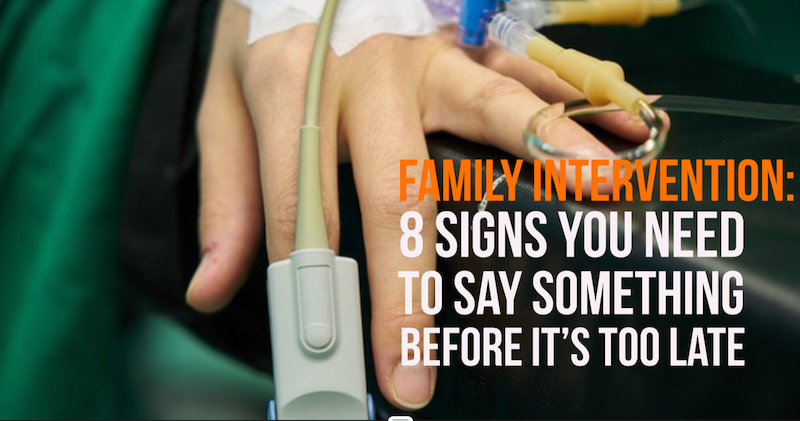One of the hardest things we can do in life is watch our loved ones go through the stages of a drug or alcohol addiction and sit by as they deteriorate and struggle. Quite often we realize that there is a problem before they do, and we feel helpless as they struggle through the consequences of their continued drug use while remaining in denial that there is a problem.
Sometimes the only way that they may ever get the wake-up call is when someone they love or respect steps in to intervene, but just when to do that when the addict will be open to an intervention can be hard to judge.
What is an Intervention?
It sounds like a big and intimidating process, but an intervention is simply a meeting of friends and family, with professionals involved if necessary, to try to inspire change in the addict. Remember that most of the time the addict may not even realize how badly they are addicted, so an intervention needs to be carefully planned at a time when the addict is able to be mentally and physically receptive to hearing what needs to be said.
During the intervention, the family and friends need to be real with their loved one and explain how the addictive behavior is affecting each of them. They also need to encourage the addict to be open to receiving help. In addition, educational counseling and support needs to be given, with preparation having been done beforehand to give the addict structured suggestions of how to change and get help.
When is an Intervention Necessary?
Staging an intervention can be very difficult emotionally for you, but it may also be the only way to help your friend or family members before it is too late. There are signs to look for to determine if an intervention is necessary. If you see any of these signs, it is time to step up and say something to get them help.
1. They are missing excessive amounts of work due to the effects of the drug.
Or, they miss work in order to use the drug, or take time to track down and get it. Hangovers or withdrawal symptoms may cause them to call in sick, and then they spend their sick days using the drug to get rid of the feelings of illness. Any of these scenarios are causing them to avoid responsibility in exchange for their next high and need to be stopped. Stepping in before they lose their jobs and their reputation in the community, along with the ability to possibly get another job, is urgent at this point.
2. They are cancelling out on social events to use instead.
If they would rather stay home than hang out with friends and family or are cancelling out on things that they once looked forward to, it is time to step up and say something. Not only are they losing large chunks of their lives that they may never get back, but they are hurting the people who depended on and looked forward to their inclusion in the activity. This is especially important when children are involved and may not understand that the addict is not intentionally trying to ignore or neglect them.
3. Their bills are piling up.
Instead of paying their bills, they are scoring their illicit drugs or buying alcohol. If you notice they are having financial difficulties due to a skew in priorities where their addiction is more important than their financial obligations, an intervention should occur.
4. They know there is a problem but still continue to use the drug anyway.
Maybe you have already talked to them, and they admitted to you that they know they use too much, but there is always an excuse or a delay on when they are planning to quit. They may say that it is not as big of a problem as you think it is, that you are overreacting, or that they can quit any time they want to but they do not want to yet.
At this point they are probably pulling away from you out of a subconscious embarrassment that they know there is a problem and can’t stop. If they know it is a problem and still continue to use, then they need further intervention by people who can help.
5. They are in denial about there being a problem and cannot see their lives becoming more difficult due to their drug or alcohol use.
If the bills are piling up around them, or they are hanging on to their jobs and their families by a thread, but they still are in denial that they have a problem, someone needs to step in and wake them up. At this point, include a professional in the intervention. Denial is a hard wall to break down in an addict’s mind and alcohol and drug addictions are physical diseases that affect the brain, so it is possible the denial is caused by something that the addict physically and mentally can’t control.
6. They see that they are hurting their loved ones but remain unaffected by the emotional and physical turmoil they are causing.
The addict and their family hurt when there is a loss of income or neglect of responsibilities. It is easy to see that those you love are being affected by your addictive behaviors, but an addict requiring an intervention often continues to respond in the same hurtful manner regardless of the painful effects.
7. They are becoming physically or mentally abusive to those around them.
Any sort of deviation in their personality is a warning sign, but also abuse is a red flag. Handling any sort of mental or physical abuse early is key to avoiding serious problems that can result in irreversible consequences. Intervention is necessary and required if the addict begins to demonstrative abusive tendencies or behavior. If the violence becomes serious, it may be necessary for a domestic violence professional to step in to perform the intervention while the victim distances themselves from the addict temporarily, or possibly permanently if necessary.
8. They become moody or exhibit personal difficulties due to use.
The moodiness or difficulty with personal grooming and activities of daily living can occur when they are withdrawing from the drug or when they are on it. Either one is a warning that the chemicals in the drug are affecting their brain and causing damage that can create long lasting effects. Stumbling while walking, difficulty keeping eye movement controlled, irritability, sudden mood swings, and failure to acknowledge basic grooming like shaving, bathing, or using deodorant are just some of the signs that someone needs to step in and provide an intervention.
Treatment Options to Offer in an Intervention
Simply stepping in and telling the addict they have a problem and need to stop using is generally not effective as an intervention. Instead, create a group of the addict’s closest friends and family, as well as any professionals that can gather to help educate your loved one.
Research ahead and have a plan in mind with methods of structured support for the addict to see that there are avenues available for recovery and that they do not have to do it alone. Support from his or her friends and family is generally the difference between a successful recovery and continued relapses into the addictive behavior.
An addict can receive treatment at home, but it is most successful when the addict moves away from any possible temptation and opportunities that allows them to acquire drugs. Treatment facilities like the Addiction Recovery Centre have medical professionals and trained staff who are prepared to recognize the symptoms of withdrawal and treat the recovering addict accordingly.
Recovery centers are often affordable, with many insurance companies understanding the importance of rehabilitating individuals back into productive members of society before they deteriorate physically and require extensive medical treatment. Even if the addict does not have insurance, there are often programs that can help pay for the stay in a recovery center.
When price is a factor in determining treatment options, remember that no amount of money is worth losing your loved one to drug addiction. They will likely gradually lose their jobs, their homes, their families, and often their lives before they are able to quit their addiction.

Step in to Help Save a Life
Many obstacles stop us from stepping in and intervening in to help our loved ones. We may feel that it is not our place, or that the addict is an adult and knows what he or she is doing. We may worry that by forcing treatment at a recovery center we are going to cost them their jobs or reputations.
These are all valid concerns, but with a serious addiction there is no end to the downward spiral until a recovery is mandatory. Either encouraged by the addict or by someone else, or, tragically, it may end with death. By stepping in to intervene, you may end their life as they were living it and give them the opportunity to create a healthier, happier addiction-free one.


